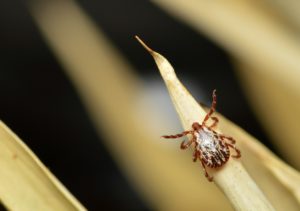Feral hogs play host to a variety of internal and external parasites that can lead to disease or other issues in the right conditions. Some pathogens can be moved from an infected hog to a human host through the bite of an arthropod, or consumption of under cooked meat. The effect of each parasite will vary depending on what species is infected. In some cases, a feral hog may be infected with a certain parasite and exhibit no clinical symptoms, but if another species were exposed to the same parasite, it could lead to a fatal disease.
Toxoplasmosis is an important zoonotic disease that can be transmitted to humans and accounts for one cause of food borne illness related to raw or undercooked meat (pork, lamb, and wild game). It is caused by a single celled parasite called Toxoplasma gondii. The final host of the parasite includes a variety of feline species, but T. gondii can infect other mammals during its life cycle. Many carnivore and omnivore species who are infected with the parasite as an intermediate host never show symptoms of toxoplasmosis. Infection rates in feral hogs have been found to range from 0% to 50% in sampled populations, but no feral swine have ever been reported with.
Trichinosis is a disease caused by round worms or nematodes in the genus Trichinella. The species of nematode varies depending on the animal infected. Trichinella spiralis occurs in feral and domestic swine worldwide. Historically trichinosis was an issue with pork products in the United States, but efforts have been made to reduce the prevalence of this nematode in commercial pork operations. Today the primary risk of infection comes from undercooked game meat and domestic swine raised on pasture.
Pigs can also carry Ascarid worms in their small intestine. Pigs are the primary host for this parasite and in commercial swine operations, infections can result in difficulty breathing, weight loss, lethargy, liver lesions, and ultimately financial losses to pork producers. Feral hogs infected by this worm rarely show signs, but their fecal matter can still contaminate the environment with worm eggs.
Kidney worms are another internal parasite often found in feral and domestic swine. These worms cause clinical symptoms when they move through the liver, kidney and other organs. Symptoms include loss of appetite, loss of body condition, hind quarter paralysis, and when numbers are great enough, death. Pigs are the only known host of this parasite, but economic losses to commercial production can be significant.
Feral swine can play host to a variety of tick species depending on the region of the country they inhabit. Ticks are capable of carrying and transmitting a variety of disease to humans and livestock. Care should be taken when handling feral swine to avoid being bitten by any ectoparasites they might be carrying.
For information on how to safely handle and consume feral hog meat, click here.
